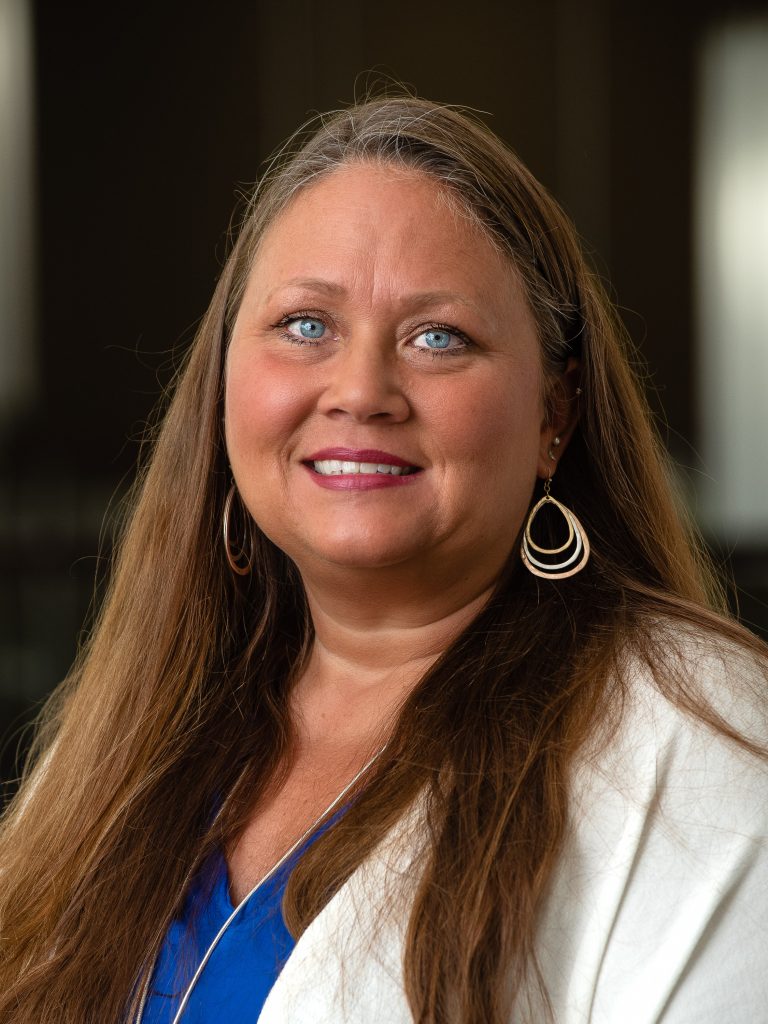The upper division consists of five semesters of nursing courses that make up the professional component of the curriculum, with some that include theory and clinical lab components. Courses focus on providing students with essential knowledge and skills to provide care to persons in a variety of health care settings. Nursing courses are designed to build on preceding semesters; foster the development of critical thinking and progressively independent decision-making; and provide collaborative opportunities for students with other health care providers. Therefore, students must successfully complete all clinical and non-clinical courses in a semester before progressing to the next semester coursework. In addition, a variety of nursing elective courses, including opportunities for independent study, are offered at different times throughout the curriculum.
Students use knowledge gained in the classroom and other methods of learning as they provide nursing care to individuals, families and groups in a variety of health care settings.
Upon completion of the program, the graduate will be able to:
1. Synthesize knowledge from the disciplines of nursing, the sciences, and the humanities as the basis for decision-making for the professional practice of nursing;
2. Utilize critical thinking such as inquiry and analysis in promoting, attaining, or restoring health throughout the life span;
3. Incorporate evidence-based practice in the delivery of patient centered care;
4. Employ skilled communication to collaborate with intraprofessional and interprofessional colleagues in efforts to identify and meet the changing needs of the health care environment;
5. Demonstrate responsibility and accountability for personal and professional growth and professional nursing practice decisions;
6. Provide patient centered care using skilled communication techniques within a framework of legal, ethical and professional standards;
7. Demonstrate leadership principles when managing the care of individuals and groups;
8. Demonstrate caring behaviors when working with individuals and groups;
9. Facilitates patient centered care including patient education and patient safety employing a range of technologies;
10. Demonstrate knowledge of social justice principles for a diverse society relevant to health and the delivery of health care;
Program of Study:
Students need to keep in mind that deviation from the scheduled program of studies may lengthen time spent in the curriculum. Upon progression to upper division, permission to depart from the clinical sequence must be obtained from the Associate Dean of Undergraduate Programs. Because of the limitations in clinical course spaces, departure from the sequence for any reason may significantly lengthen the time for program completion.
NOTE: The Capstone College of Nursing reserves the right to make modifications in its program and policies as necessary, but every effort will be made to implement the general program for full-time students.
Grading:
Effective Fall Semester 1999, the faculty of the Capstone College of Nursing adopted the following numerical scale to accompany The University of Alabama grading system. Final course grades will be calculated to the tenths place and not beyond.
Grading Scale
| Letter Grade | 100 Point Scale | Grading Points on the 4 Point Scale |
| A+ | 98-100 | 4.33 |
| A | 94-97 | 4.00 |
| A- | 91-93 | 3.66 |
| B+ | 88-90 | 3.33 |
| B | 85-87 | 3.00 |
| B- | 83-84 | 2.66 |
| C+ | 80-82 | 2.33 |
| C | 77-79 | 2.00 |
| C- | 75-76 | 1.66 |
| D+ | 72-74 | 1.33 |
| D | 69-71 | 1.00 |
| D- | 67-68 | .66 |
| F | 0-66 | 0 |
When a grade of less than a C- is earned, the course must be repeated to be considered as applicable toward the Bachelor of Science in nursing degree.
A 75% average must be achieved on all exams to pass class. A 74.49 does not round up but a 74.5 rounds up.
Advising
Upper Division students are advised via email by the Administrative Specialist of Undergraduate Programs during the designated preregistration advising period in the fall and spring semesters.
No request for specific clinical days will be accepted. Assigned days for the upcoming semester will be published by the end of the current semester to allow for scheduling purposes.
There is no late registration for clinical nursing courses. If extenuating circumstances have made regular registration for clinical courses impossible, approval for late registration in these courses may be requested from the assistant dean of Undergraduate Programs.
Registration Procedures
Check your Crimson email often! Registration times vary. You must confirm your schedule in myBama or it will be dropped. Payments can be made through myBama.
Expenses
In addition to expenses common to all students enrolled at The University of Alabama, there are additional expenses specific to the nursing program. These additional expenses are listed below to help students plan. The expenses of the first and last semesters in upper division are greater than those of intervening semesters.
The upper division consists of five semesters of nursing courses, with some that include theory and clinical lab components. Students provide knowledge gained in the classroom and other methods of learning as they provide nursing care to individuals, families and groups in a variety of health care settings.
|
Type of Expense |
Approximate Cost |
| Health Insurance–Upon promotion to upper division, students must provide evidence of current/active adequate health insurance to cover long-term and emergency treatment. | Variable annual costs |
| Nursing College Fees–The technology/infrastructure fee is an additional charge associated with a student’s specific class enrollment for each term. The fee is used to meet the instructional needs of full access to the technology required by our students, faculty, and staff and provide a safer campus environment. | $27.00 Per course hour |
| CPR Certification–Upon promotion to upper division, students are required to submit evidence of American Heart Association’s Basic Life Support (BLS) for Healthcare Providers that extends through the entire semester is required before a student begins a clinical nursing course and must be renewed annually. Fees charged by certifying agencies for initial certification and annual renewal vary and are the responsibility of the student. | Variable annual costs |
| TB Test–Upon promotion to upper division, students are required to submit evidence of a two-step tuberculin skin test or IGRA blood test. If either skin test or blood test is positive, an annual negative chest X-ray is required. A one-step TB skin test or IGRA blood test will be required annually after the initial. Fees charged for the TB test vary by provider and are the responsibility of the student. | Variable annual cost |
| Background Check and Drug Screen–Upon promotion to the upper division, students are required to submit to a drug screen and background check and must be renewed annually. Costs for background check and drug screen are billed directly to the student by Employment Screening Services. | $82.75 (may vary) Annual cost |
| Health Requirements–Upon promotion to upper division, students are required to submit a Nursing Student Health and Physical Exam Form, Nursing Student Immunization Form and Respirator Medical Evaluation Questionnaire completed by a physician or certified registered nurse practitioner. Completed forms are uploaded to the online immunization and record tracking system. Fees charged for the physical, completion of the forms and any needed immunizations vary by provider and are the responsibility of the student. There is a one-time $38.00 charge for the online immunization and record tracking system that is billed directly to the student by Employment Screening Services. | $38.00 One-time cost (plus the cost of immunizations and physical exam) |
| Clinical Uniforms–Upon promotion to upper division, students are required to purchase items comprising the clinical uniform, which have been approved by the College. These items will be used throughout the professional component of the curriculum and include two uniforms purchased from the vendor on contract. The cost of these two uniforms ranges from $145.00 to $160.00. A warm-up style lab coat with cuffs, all white leather shoes (sneaker or nursing), and a watch with sweep second hand are also required as well as a polo-type shirt that will be worn with scrub pants in certain clinical situations as specified by course faculty. Approximate cost for the polo is $37.00 and will be ordered through JNJ Apparel. Approximate cost for the lab coat is $45.00 and can be purchased from the vendor on contract or any nursing uniform store. Cost of the shoes and watch varies with personal preference. | $145.00-$250.00 One-time variable cost (plus the cost of shoes and watch) |
| Physical Assessment Equipment–Upon promotion to upper division students must purchase a complete set of physical assessment equipment/supplies. The set includes: stethoscope with bell and diaphragm, percussion hammer, retractable tape measurer, Snellen eye chart, pen light, bandage scissors, clear metric ruler, blood pressure cuff, tuning fork, china marking pen, transparent metric ruler, eye protection glasses, EKG ruler, and digital thermometer. Assessment Kits are purchased through the University Supply Store. | $140.00 One-time cost |
| Mobile Devices and Required Software–In the second semester of Upper Division, students at the Capstone College of Nursing are required to purchase Davis’ Drug Guide software for their mobile device to be used in their coursework, clinicals and throughout the curriculum. | $40.00 (may vary) Annual cost |
| Travel Expenses–Nursing students assume individual responsibility for their transportation to health care agencies. The amount of travel varies with each clinical course, and the cost increases when the students’ assignments are in rural areas or outside Tuscaloosa County. | Cost varies per semester |
| Textbooks and Packets–Each nursing course has a listing of required and recommended textbooks. Students are expected to have in their possession all books listed as required, and access to books identified as recommended. | Cost varies per semester |
| Standard Assessment Tests–Proctored standardized tests are required periodically throughout the curriculum. Examination costs are billed to the student by Student Receivables. | $65.00 per semester |
| Student Clinical and Review Materials–In order to enhance student outcomes, specialized educational tools and resources are used throughout the curriculum. These include content based assessments, skills improvement & remediation, and live review. Clinical experience also plays a key role in any nursing program. The more clinical experience a student has, the better prepared they are to enter the nursing field. Placement shortages, budget cuts and restrictions make clinical hours and experience difficult, leaving students without the training they need. In order to ensure students get the clinical experience they need to develop their clinical judgement, master key nursing skills, learn effective communication and become practice-ready nurses, a suite of nursing tools is required that includes Real Life Clinical Reasoning Scenarios, Video Case Studies and Skills Modules. Clinical and review costs are billed to the student directly from Assessment Technologies Institute, LLC. | $321.00 per semester |
Graduation Expenses–During the senior year, students need to plan for extra expenses related to graduation and application for the licensure examination for registered nurses. Expenses typically include the following:
| One-time cost $480 – $533 |



